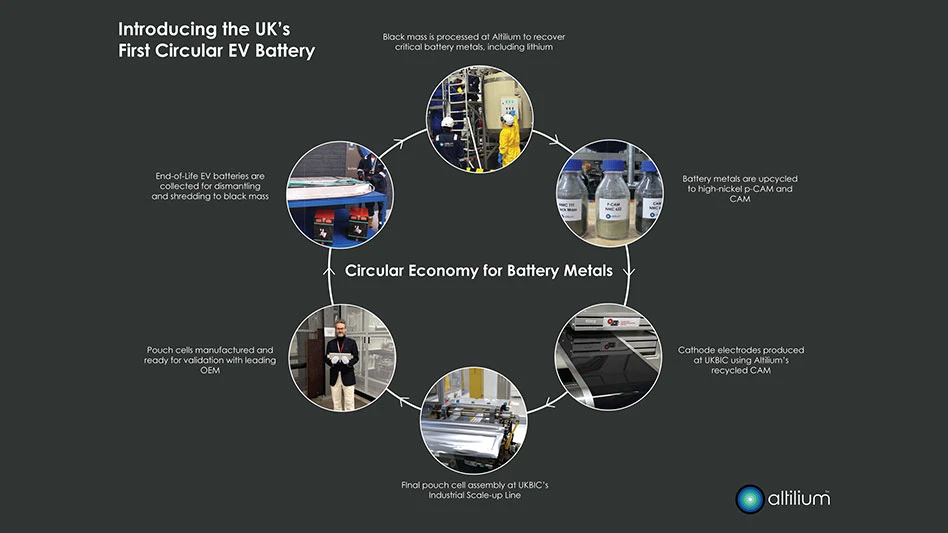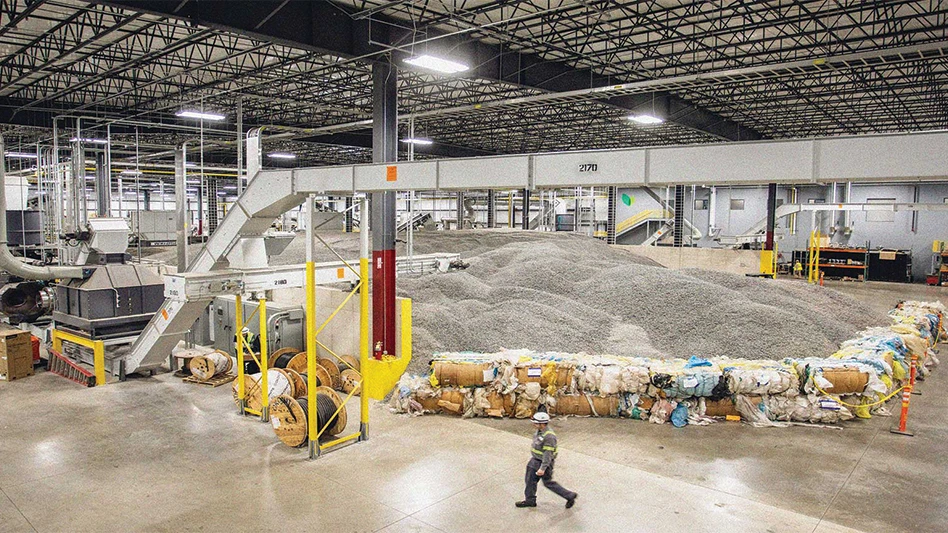Kevin Cronin has worked in the plastics sector for four decades. He currently is vice president of sustainability and R&D at Ultra-Poly Corp., Portland, Pennsylvania. The firm has 170 million pounds of annual production capacity across three plants and specializes in custom compounding of recycled engineering-grade plastics, toll processing, contract manufacturing and trade and handling services.
“Recycling has steadily increased in importance to the industry over the past 20 years,” he says. “It has moved from being a way to opportunistically improve [the] economics of making products to becoming a strategic and market-driven requirement for many processors and brand owners.”
However, Cronin says he believes work remains to be done in the form of increasing “collaboration amongst key stakeholders in order to achieve a more rapid realization of decreasing landfilled scrap and increasing circularity.”
He shares his perspective on the evolution of the plastics recycling industry and his career in the interview that follows.
How has plastics recycling changed over the years? Commercially available recycled materials have advanced from relatively low-quality regrind to compounds with specified properties that are certified and produced on state-of-the-art equipment. Advances in machine technology, chemistry and business processes have all helped make plastics recycling an important and vital segment of the plastics industry at large.
Where do you see opportunities for plastics recycling? What about challenges? [Postconsumer] recycling rates are still well below what we as an industry should be satisfied with and where the general public believes that they should be. The conundrum that we face is that the general public wants recycling rates to be higher but at the same time [they] are not typically willing to do more than they do right now, which is to put their home-generated, commingled recyclables in a single can on the curb. Consumer education and behavioral modification is perhaps the most impactful opportunity to increase postconsumer rates.
I strongly believe that design for sustainability is also a particularly important area for improvement. Brand owners and packaging companies need to embrace this to a much greater degree and learn how to marry that with design aesthetic and marketing imperatives. There are far too many products and package types that are essentially nonrecyclable in a very practical sense. This needs to be driven at the academic level as well as the commercial level.
Our greatest challenge is to make steady improvements in our recycling and sustainability initiatives and make real progress on the negative impacts of the solid waste issues. We also must combat the negative perceptions in the public and many NGOs (nongovernmental organizations) with facts and results.
What misperceptions about plastics recycling do you wish you could debunk? That the industry itself is solely responsible for increasing recycling rates and for addressing the negative impact that plastic waste has on the environment. It is vitally important that every consumer and every brand owner that uses plastics recognize the responsibility that they have in the life cycle of any plastic part, be it a product or a package. The issue of plastics polluting our environment is complex, and the solutions will require the cooperation of everyone who makes and uses plastics, as well as the waste management and recycling industries.
What professional accomplishment are you most proud of? I have had the opportunity to work in a wide variety of positions with several different companies in a wide range of end markets and industries and have been fortunate enough to have made what I believe to [be] significant contributions in many of them. So, picking one to say I am most proud of is difficult and self-serving. Rather, I would say that my continued work in advancing recycling and sustainability within our industry is a source of great satisfaction and pride.
How have equipment vendors helped to address the challenges the plastics recycling industry is facing? Equipment vendors have helped through continuously improving the technical capabilities and robustness of what they build. For instance, scanning technology continues to improve on the NIR (near-infrared) front as do separation techniques allowing for increased speed and accuracy that results in cleaner bales of commodities coming out of MRFs (material recovery facilities).
However, the volatile nature of prices in some of the commodities markets does not allow a lot of MRFs to invest in the latest and greatest equipment, leaving them to produce inferior quality bales.
So, equipment technology is not the laggard but rather it is the inherent costs associated with upgrading to the latest technology.
How important to you are concerns about “greenwashing”—environmental claims that don’t hold up?Greenwashing can have a huge negative impact on plastics recycling. We still see far too often a package claims that it is “100 percent recyclable” which technically speaking can apply to anything that is made from a thermoplastic material. However, practically speaking it is very often the case that material is either a specialty engineering grade or the package or item is made from multiple, incompatible resins for which there is either no infrastructure or technology to collect and isolate or processing scheme to economically reclaim.
These activities erode public trust and are fuel for some of the NGOs that are most vocally opposed to plastics, and we as an industry need to support its eradication through self-policing.
What advice can you offer to younger people entering the industry? With significant challenge comes significant opportunity. There is very real opportunity in this industry to actually “do well by doing good.” While some would say that the solid waste issue is an existential threat to the plastics industry, the reality is the positive impact that polymer technology brings to society far outweighs the negatives on balance. Without question recycling rates can, and must, improve and there is no one solution. There are significant opportunities to be part of the solution by careers in education and awareness, technology development, logistics and business process development and simply hands-on operation of recycling facilities. It is also a global issue and the social and economic impacts are felt around the world; if the problems are global so, too, the solutions must be and that creates multinational, cross-border collaboration needs.
Who has served as your role model? I do not have any one single person that I can point to that is a role model. To be sure, this industry has many innovators; some with high profiles and others who are more obscure but often as impactful and sometimes more so and I have great deal of respect for all of them. I have been in the plastics industry for 40 years and only the last 12 have been squarely in the sustainability part of the business.
My formal education in plastics was gained at UMass Lowell, and I would have to say that the depth of knowledge that I received during that time from some of the industry’s smartest people has led to a life-long appreciation of the industry and thus a passion now for wanting to be part of the solution to its greatest challenge.
What professional accomplishment are you most proud of? I have had the opportunity to work in a wide variety of positions with several different companies in a wide range of end markets and industries and have been fortunate enough to have made what I believe to significant contributions in many of them. So, picking one to say I am most proud of is difficult and self-serving. Rather, I would say that my continued work in advancing recycling and sustainability within our industry is a source of great satisfaction and pride.

Explore the Fall 2019 Plastics Recycling Issue
Check out more from this issue and find your next story to read.
Latest from Recycling Today
- Returpack reports increased DRS activity in Sweden
- Trade groups align against European export restrictions
- Construction, auto sectors show mixed signals
- Politics in Turkey threaten recycled steel outlet
- Toppoint Holdings expands chassis fleet
- Lego creates miniature tire recycling market
- Lux Research webinar examines chemical recycling timetables
- Plastics producer tracks pulse of wire recycling market





